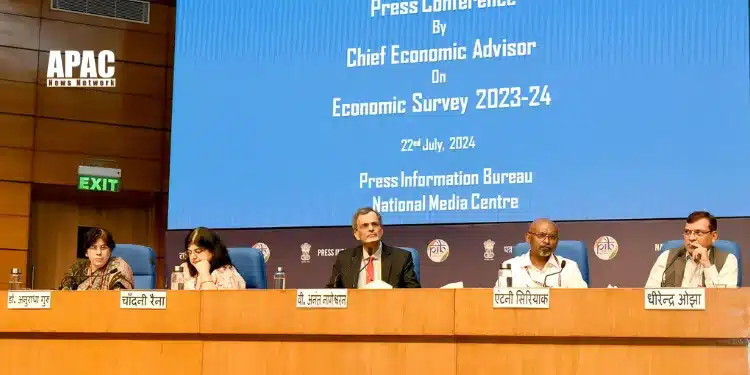Economic Survey 2024-25: A Path to Growth

The Economic Survey for 2024-25 was presented in Parliament today by Union Minister for Finance and Corporate Affairs, Smt. Nirmala Sitharaman. This year’s preface emphasizes a philosophical approach to governance, advocating for significant deregulation to stimulate economic growth and job creation. The survey highlights the pressing need for India to adapt to unprecedented global challenges, particularly in light of political and economic uncertainties that have emerged worldwide. With elections approaching in major democracies like India, the USA, and Indonesia, the survey underscores the importance of a proactive and flexible economic strategy.
Deregulation as a Catalyst for Growth
The Economic Survey argues that reducing regulatory burdens can significantly enhance business innovation and competitiveness. It states, “Getting out of the way and allowing businesses to focus on their core mission is a significant contribution that governments can make.” This approach, termed the Deregulation Stimulus, aims to raise the growth average over the next two decades and capitalize on India’s demographic dividend.
The survey advocates for a shift in regulatory philosophy from “guilty until proven innocent” to “innocent until proven guilty.” This change would simplify regulations, making them more comprehensible and aligned with their original intent. The report emphasizes that adding unnecessary layers of operational conditions complicates policies and detracts from their effectiveness. Furthermore, it calls for building a trust-based society, similar to the successful IT and startup ecosystems that emerged in Bengaluru during the 1990s. The survey expresses optimism that the Indian public can turn challenges into opportunities, paving the way for a developed India by 2047.
Strategic Investments for a Competitive Economy
In the context of global economic shifts, the survey highlights the need for India to attract both domestic and foreign investments. It notes that the era of rapid world trade growth has passed, and India must focus on strengthening its domestic supply chains. The report suggests that private sector investments are crucial for enhancing resilience and competitiveness in the long term.
The survey also emphasizes that domestic growth drivers will be more critical than external factors in the coming years. It encourages the government to create an environment that fosters strategic investments, which will ultimately lead to a more competitive and innovative economy. By promoting a robust investment climate, India can better position itself to navigate global challenges and enhance its economic standing.
Addressing Climate Change and Energy Transition
The Economic Survey places significant emphasis on public policy’s role in ensuring energy security and affordability. It advocates for India to chart its own path in transitioning away from fossil fuels, focusing on electric mobility and renewable energy sources. The report argues that public transportation is a more efficient alternative for energy transition, given India’s vast size and limited land availability.
Moreover, the survey warns against deepening dependence on external sources for critical energy imports. It stresses the importance of focusing on adaptation strategies rather than solely on emission mitigation. By prioritizing energy transition and diversification, India can enhance its competitiveness while addressing the pressing issue of climate change.
Skilling and Education for Future Readiness
To harness the potential of technological advancements, particularly in Artificial Intelligence (AI), the survey emphasizes the need for robust skilling and education programs. It argues that India’s youth must be equipped to stay ahead of technological developments to mitigate potential adverse impacts on employment. The report suggests establishing Artificial Intelligence Centres of Excellence (CoE) at top educational institutions, backed by a substantial financing corpus to stimulate private sector innovation and research.
The survey recognizes that AI cannot be a one-size-fits-all solution, especially for a labor-rich country like India. Therefore, it calls for a balanced approach to integrating AI into the economy while ensuring that the workforce is prepared for the changes it brings. By investing in education and skill development, India can empower its youth to thrive in an increasingly technology-driven world.
Observer Voice is the one stop site for National, International news, Sports, Editor’s Choice, Art/culture contents, Quotes and much more. We also cover historical contents. Historical contents includes World History, Indian History, and what happened today. The website also covers Entertainment across the India and World.

